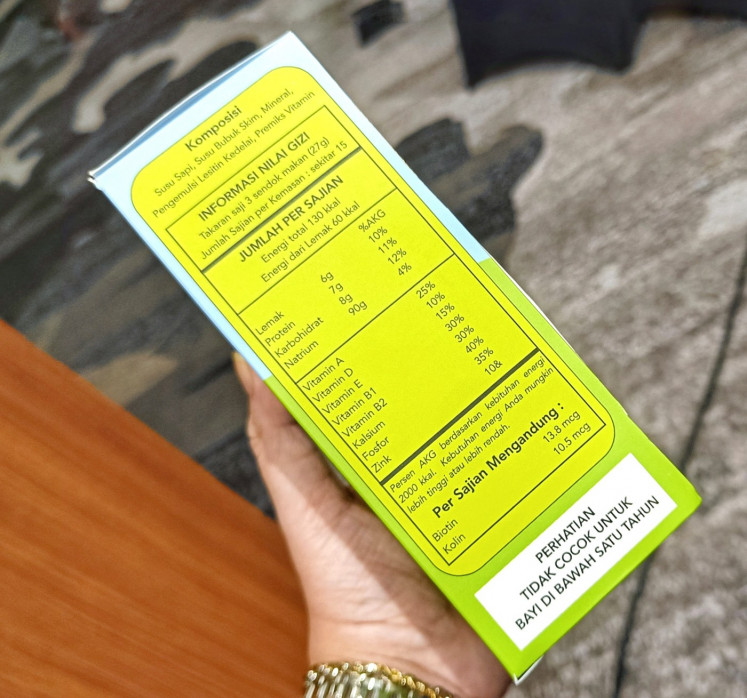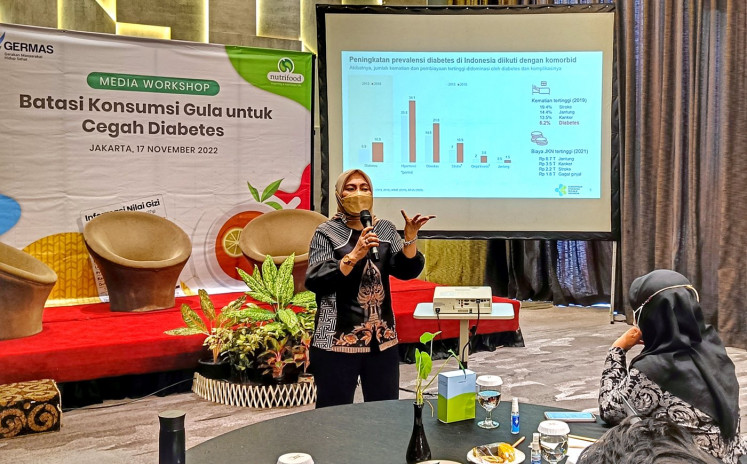Popular Reads
Top Results
Can't find what you're looking for?
View all search resultsPopular Reads
Top Results
Can't find what you're looking for?
View all search resultsHealth tips: How to prevent and control diabetes
Change text size
Gift Premium Articles
to Anyone
Experts share new facts about diabetes and practical tips to prevent and control the chronic disease.
The festive season has arrived. It is time to indulge in good food and drinks. But please take caution as grave dangers lurk behind overconsumption of rich, sugary and savory meals. One of the perils of overindulgence is diabetes.
“Currently, 537 million people [worldwide] are living with diabetes,” Eva Susanti, director of prevention and control of non-communicable diseases of the Health Ministry said during a discussion with Nutrifood at The Akmani Hotel, Jakarta, on Nov. 17. “And the number is predicted to become 738 million by 2045,” she added.
Among the nations with the highest number of diabetics, Indonesia sits on number five, after China, India, Pakistan and the United States, with over 19.5 million people diagnosed with the chronic disease.
Diabetes is also among the top five non-communicable diseases that cause deaths in this country.
“One of the main risk factors [of diabetes] is overconsumption of sugar,” Eva said.
Indonesia perches on the top three of the biggest consumers of sugar among ASEAN countries, with over 5.5 percent of the population consuming more than 50 grams of sugar per day.
According to a research by the Health Ministry, the majority of Indonesians’ sugar consumption comes from ready-to-drink teas, condensed milk and fruit juice powders.
“This is so worrying,” Eva said. “If we don’t take precaution, Indonesia could reap heaps of non-communicable diseases in the future.”
By 2045, the number of Indonesians diagnosed with diabetes is predicted to swell to 28.6 million people. As diabetes is a metabolic syndrome, the disease usually affects many other organs and disrupts their functions.
“According to the American Diabetes Association, people with diabetes are 2.6 times more prone to heart attack,” said internist Rudy Kurniawan.
According to Rudy, 17 million people in the world living with the chronic disease are also diagnosed with retinopathy, which often leads to blindness. In addition, 44 percent of people with diabetes develop Chronic Kidney Disease (CKD), which could lead to cardiovascular diseases.
He added that recent medical research in Australia found people with diabetes have 10 to 11 percent lower productivity at work than their healthy colleagues.
Another risk factor for diabetes is people’s lifestyle, which is getting more sedentary these days.
“Technology advancement also contributes to the increase of diabetes prevalence in the country,” Eva said. “[Due to] technology, such as ride-hailing and food delivery apps, people are becoming lazier and more immobile.”
Indonesians’ reluctance to see a doctor unless absolutely necessary is another factor.
“There’s a culture among Indonesians of not seeing a doctor unless they feel really sick,” Eva added. “Unfortunately, for a lot of non-communicable diseases, when you feel ill, [the disease] is already at a later stage.”
Check the ingredients: Pictured is a dummy box of a non-actual product during a discussion with Nutrifood at The Akmani Hotel, Jakarta. Consumers are advised to read the food label and nutrition contained in processed foods and drinks. (JP/Sylviana Hamdani) (JP/Sylviana Hamdani)Limiting salt, sugar and fat
As in any other diseases, preventing diabetes is better than treating it. The Health Ministry thus encourages Indonesians to watch their sugar, salt and fat consumption in a campaign called Batasi GGL (Limit Sugar, Salt and Fat).
The Health Minister Regulation (Permenkes) No. 28/2019 recommends to limit daily sugar intake to less than 52.5 g (approximately four spoonfuls per day), salt to less than 2,000 milligrams per day (approximately one teaspoonful) and fat approximately 67 g (five spoonfuls per day).
The recommendation sounds rather theoretical, but health experts show how to correctly measure and limit the daily consumption of these potentially harmful ingredients.
Expert talks: Eva Susanti, director of prevention and control of non-communicable diseases of the Health Ministry, explains the prevalence of diabetes in Indonesia at The Akmani Hotel, Jakarta, on Nov. 17. (JP/Sylviana Hamdani) (JP/Sylviana Hamdani)Sweet is a matter of perception
Sweet food and drinks are favorites among many Indonesian people. But we can change this behavior, especially for the young generation.
“Sweetness is really just a matter of perception,” Rudy said. “From an early age, parents should educate their children to choose food and drinks with less sugar.”
Rudy added that the more children consume sugary food and drinks, the more they will crave for them. This behavior will carry on to their adulthood. The same tendency is also true for salty and fatty products.
But what if we, as adults, are already accustomed to overly sweet, salty and fatty products?
According to Rudy, the key is cutting them immediately and discipline our palates to savor cleaner tastes.
“The more accustomed we are [to cleaner flavors], the more we’ll disdain and reject overly sweet, salty and fatty products,” he said.
Watch your plate
Rice, a staple food for Indonesians, is immediately turned into glucose as it enters the body. For healthy people, insulin manages this sudden spike of blood sugar and turns it into energy. However, for diabetics, this instantaneous hike of glucose could possibly be lethal.
To better our consumption of rice, the Health Ministry has issued Isi Piringku (What’s On My Plate), an easy and practical guideline to portion meals according to our daily nutritional requirements.
Based on this guidance, rice should only fill a quarter of our plate in each meal. The other parts should be evenly divided between protein, vegetables and fruit.
“[Isi Piringku] is good, practical advice that enables us to easily portion our food intake in a healthily balanced way,” clinical nutrition doctor Marya Haryono said during a telephone interview on Nov. 30.
In addition, choosing brown, black or red rice rather than the white variety is proven to be more beneficial to our body.
“Basically, rice that has natural colors is better as they generally have higher fiber content and a lower glycemic index,” the doctor said. “But we should still eat them in moderate portions.”
Sri Lankan scientists recently conducted a study of boiling rice in coconut oil and refrigerating it for 12 hours before consumption to lower its glycemic index.
“Cold rice indeed has a lower glycemic index, but we don’t have to torture ourselves this way,” Marya said. “It’s okay to eat warm rice as long as we eat it proportionately with other sources of nutrients.”
While eating fruit is good for our fiber intake, people living with diabetes should refrain from those with overly sweet flavors.
“Durians, longans, rambutans and overripe bananas are not suitable for people with diabetes as they have naturally high sugar content,” Marya said.
Read the label
Another easy, yet often forgotten strategy to eat healthily is by reading the label on the packaging of processed foods and drinks that we consume and calculate their sugar, salt and fat contents accordingly.
“According to the Food and Drug Monitoring Agency (BPOM) Regulation No. 31/2018, processed foods and drinks should have their nutritional contents inscribed on the packaging,” said Sofhiani Dewi, coordinator of the substance standardization group for special nutritional requirements, claims and nutritional value information of processed foods at the BPOM.
“And reading every information on the label is crucial as [the label] is the main communication between producers and consumers,” she added.
According to Sofhiani, the Health Ministry is currently working on a regulation for putting a similar label on fast foods and drinks.
“So, consumers have to do their homework [by reading the label] to eat healthily,” she said.
Home-cooked meals
To reduce our salt intake, it is best to refrain from highly processed food, including canned and instant food.
“It’s better to cook our own meals, if possible,” Marya said. “This way, we can really control our salt intake accordingly.”
She also advised us to choose boiled, sautéed or steamed food when dining out.
“Most cooking oils, such as vegetable oil, palm oil, coconut oil, as well as butter and margarine, are high in saturated fat,” Marya said.
Excellent sources of polyunsaturated and monounsaturated fats are ocean fishes, such as mackerels, sardines and tunas, as well as avocado.
“You see, we can still enjoy good food and be healthy, as long as we know what to choose,” she reiterated.
Exercise routine
People with diabetes should exercise regularly for 30 minutes per day, five times a week, in order to maintain their health.
“[The amount of exercise] cannot be accumulated on the weekends,” Rudy said. “We have to exercise regularly for the best results.”
He also reminded people with diabetes to stop smoking, manage stress and have enough rest to control their condition.
“It might sound cliché, but we can only maintain good health if we consistently practice a healthy lifestyle,” he concluded.













